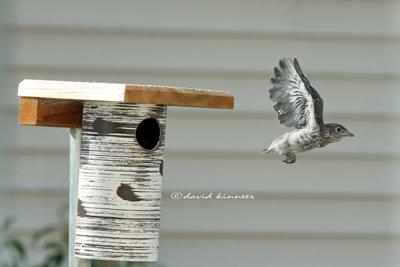QUICK TIPS: Young bluebirds (and most small cavity nesters) rarely return to the nest after leaving. Thus, right after fledging is a good time to clean a box out so it is ready for the next occupants.
Question: Do baby birds return to the nest after fledging?
Answer: It depends on the bird. For most small cavity nesters like bluebirds, the answer is typically NO.

Once young bluebirds leave the nestbox for the first time (called “fledging”) they almost always stay out in the real world, learning to fly, feed themselves, and survive.
-
- Returning to the cavity they were born in could make birds more vulnerable to predators (especially if the box is mounted on a tree, or lacks predator protection like a wobbling baffle or Noel Guard.)
- Returning to a used nest would offer increased exposure to parasites (like mites or blow flies.)
- That is one reason why many bluebird landlords clean out the nestbox after fledging (or at least at the end of the nesting season.)
- However, never say never or always.
- In Vol. 38, No.1 of the NABS journal Bluebird, there was an interesting report of House Wren young that fledged from a nestbox, but then were all called back into the nest at dusk by an adult for two evenings in a row. The evening temperatures were below freezing. The adult House Wren called them out again in the morning. The birds did not return the third evening. (Scholer, 2015.) The author found a second report of this happening with House Wrens using a nestbox in Maine. It would be interesting to document whether this happens with other species.
- If a baby bird fledges prematurely (especially before it is old enough to fly well), it SHOULD be returned to the nest. Unfortunately they often jump out again. See tips on dealing with this situation.
- Remember that not all babies necessarily fledge at the same time or even on the same date. Some may be more bold or more chicken than their nest mates. I recount the story of an Eastern Bluebird runt (with photos) that fledged a day late here. In the same issue of Bluebird referenced above, Elsie K. Eltzroth of Oregon reported a runt Western Bluebird chick that fledged NINE days after the first two of five chicks. (29 days after hatching. The second two fledged 5 days later, on the 25th day. Western Bluebirds typically fledge 18-24 days after hatching. Note that these birds were offered mealworms due to harsh environmental conditions. Excessive mealworm consumption can result in calcium depletion.)
- Some adult birds DO return to nestboxes to roost (at night or during cold weather.)
- Birds from an earlier brood may return to the nestbox to help feed a subsequent brood. (See helpers.)
- In a subsequent breeding season, birds may return and nest again in a nestbox they used successfully in past years (called nest site fidelity – see “Will My Bluebirds Return?”)
- Piracy can occur. Enterprising Purple Martin (and less often Tree Swallow young) fledglings have been known to go back into a nestbox and beg adults for food. (They are either smart, lazy or both.)
- The young of some species of birds DO regularly return to the nest site after fledging. For example, for several weeks after fledging, eagle chicks may return to the nest and continue to be fed by adults.
References and More Information:
- Micah N. Scholer, 2015. Unusual Behavior in Parental Care by a House Wren (Troglodytes aedon): Post Fledging Use of an Old Nest During Cold Nights. The Wilson Journal of Ornithology 127:545-547.
- Charles S. Preble. 1961. Unusual Behavior of House Wren. The Auk 78:442.
- Eagle Facts, US Fish & Wildlife Service,
- On Sialis.org
- Predator and Problem ID
- Premature fledging
- Lifespan of bluebirds
- All About House Wrens
- Nesting timetables: Eastern Bluebird | Mountain Bluebird | Western Bluebird
- Feeding Mealworms | Supplementing Calcium
- Cleaning out a nestbox
- Frequently Asked Questions
- Will my bluebirds return?
- Mounting boxes on trees
- Helpers
– Charles Dickens and many others
